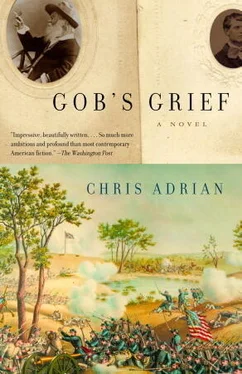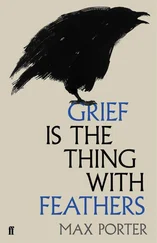“Well, you might have said so.” The young man muttered to himself for a while, and when they had passed down to the oyster boats at Tenth Street, he stood up and exited the stage. Walt’s shyness and fear evaporated immediately, and then he wished he had not been so rude, and he was inclined to chase the man down just to apologize to him.
But he was only gone for a minute. Before the car could leave him behind, he returned with a bucket of oysters and sat down again in his spot. Very soon Walt could hear him slurping them and throwing the shells down on the floor among the straw and dried mud. “Oh damn,” he said suddenly. Walt looked up to see that he had cut his thumb trying to shuck an oyster. There were only four fingers on the hand he’d injured; he was missing the littlest finger of his left hand. He brought his thumb to his mouth, staining his lips with blood. He looked away from the door and met Walt’s gaze, and Walt saw that his eyes could not have been more like Hank’s if he had stolen them and set them in his own head. Walt got a feeling, then, which crowded into his heart with the shyness and the fear, but did not displace them. This fellow, this boy, was intensely familiar — he felt sure he’d met him before, or seen his face, though he knew he had not. Give him a kiss, Walt , said Hank. Embrace him. He is for you, and you for him, a great true comrade and a great soul. He is a builder.
“Are you well, sir?” Walt asked him, because the thumb, out of the young man’s mouth now, was bleeding profusely. Walt thought back to an instance in Armory Square when his own thumb had been cut by a scalpel covered with gangrenous filth. His thumb had swelled up like a plum, then, and taken months to heal.
“It’s a scratch,” said the boy. Now Walt thought he was definitely a boy, not even twenty years old, though deep lines of care were writ on his brow. Walt leaned over, very slowly, to inspect the wound.
“It’s deep. It should be bandaged.”
“It’s not so deep,” he said. “See? Now it’s drying up.” He gave it a few shakes, and the trickling blood slowed and stopped.
“But it was deep,” said Walt, who thought he’d seen a flash of white bone between the lips of the cut.
“No,” said the fellow. “I think it wasn’t. And I am a doctor. A connoisseur, if you will, of wounds.” He put out his bloody hand for Walt to shake. “Dr. George Washington Woodhull,” he said, “but you may please call me Gob.”
Walt stared and stared at him, but did not take his hand. Though Armory Square was so fresh in his mind that he sometimes thought he could still smell blood and ether in his beard and his skin, it took him a moment to place the name Woodhull.
“Well, you are Walt Whitman. You don’t need to tell me. I knew it the very moment I entered this car. Who else, I ask you, looks like Walt Whitman? And see here, the whole city has been notified of your visit.” He moved over, sat down next to Walt, and took a copy of the Times from his coat. “‘With the advent of autumn,’” he read, “‘Walt Whitman once again makes his appearance on the sidewalks of Broadway. His large, massive personality; his grave and prophetic, yet free and manly appearance; his insouciance of manner and movement; his easy and negligent but clean and wholesome dress — all go to make up a figure and an individuality that attracted the attention and interest of every passer-by.’” Walt stared, remembering Dr. Woodhull of Armory Square, barely listening to the personal notice in the paper, though he was very pleased with it. He’d written the outline himself and submitted it to a friend at the Times.
“Mr. Whitman,” said the boy. “I am so glad to meet you.” He put his hand out again, and this time Walt took it. It was a small hand, but strong, and the boy squeezed so hard Walt thought he might whimper. He pumped Walt’s arm and with every shake Walt got a feeling, a happy feeling, as if this young fellow were pumping him up with joy. See? Hank said. Do you see him, Walt? Do you see him?
The next day Walt went planting in the park. While he waited for his new friend, he searched out places where he thought people might settle down for a picnic. Kneeling in a good spot on the meadow, near the lake, he tore up some grass and made a little bed of it on which to rest his book. He’d inscribed it earlier in a neat but carefree hand: For you.
It was his conviction that he was most successful with the reader in the open air, and so he planted, certain that a person who encountered his poems among the natural splendors of this park would be charmed and changed by them. He sat down on a bench some hundreds of feet away from where he’d left his book, and watched. Opening a paper and pretending to read it, he thought not about his prospective reader, but of Dr. Woodhull — of Gob.
Gob had invited Walt to walk with him, and walk they did, all over the city for hours and hours, so today even Walt, a perennially enthusiastic and untiring perambulator, had sore feet. Walt confessed that he already knew a Dr. Woodhull, and Gob confessed that Canning Woodhull was indeed his father, though he had not seen him since he was five years old. They talked about poems because Gob insisted that he was a great admirer of Walt’s Leaves , and they talked about politics because as night fell there began a grand Democratic meeting and torchlight procession. Democrats poured out into the street by the thousands, and the whole city was lit up with torches. On Second Avenue, Walt and Gob climbed up on a stalled omnibus to watch the procession go by. There were models of ships some sixty feet long, fully manned, and liberty cars overflowing with women in robes of red, white, and blue. Every member of the parade carried a torch. Gob laughed at a lady who wore a hat made of Roman candles, which shot tiny fireballs into the crowd along the sidewalks. The two of them had parted after the last straggler in the procession, a child wearing a placard proclaiming for Seymour, had passed by. They arranged to meet the next day in the park, and then Walt went home, thinking of his new friend, wondering that he had ever been afraid of him. Hank was silent, except to make an occasional exclamation. O joy , he said. O happiness.
In the park, Walt kept watch over his book, but though a few people passed by it, no one stooped to pick it up. His spirits were beginning to droop when he heard Gob’s voice behind him saying, “Hello, Walt!” Gob was proceeding rapidly down the carriage path, accompanied by a laughing redheaded female in liberated dress. Only their upper portions were visible above a hedge that ran along the road, and these seemed quite impossibly to be floating. Walt figured they must be on bicycles, but when they came around the hedge he saw that they had contraptions on their feet, big rubber wheels the size of a person’s head, two for each foot, attached to iron braces that fit under their shoes.
“Look, Mr. Whitman,” said the lady, who was pretty and fat, with eyes like her companion’s, blue and Hankish and beautiful. “We are velocipedestrians!” She waved her arms, catching her balance as she stopped her rolling.
“This is my aunt,” Gob said, “Miss Tennie C. Claflin. When I told her I was to meet you today, she could not stay away.”
“It is my great pleasure, sir,” she said, taking his hand and shaking it vigorously. “My very intense pleasure.” She was dressed in a dark blue tunic and skirt of blue wool, with a pair of yellow bloomers on her legs that demanded even more attention than the wheels on her feet. All over the park, as far as Walt’s eyes could see, people were pointing at her, but she seemed not to notice.
“Do you like my land skates?” Gob asked Walt. He’d told Walt the night before that tinkering and inventing were his avocations, that he had been educated as an engineer as well as a physician, and Walt had talked about his engineer brothers, George and Jeff.
Читать дальше












